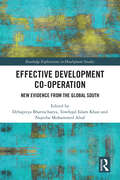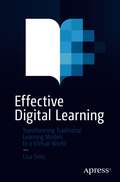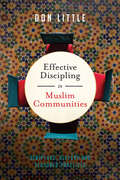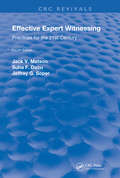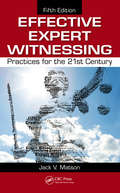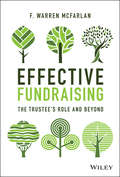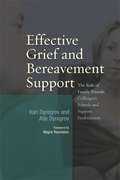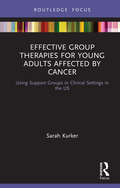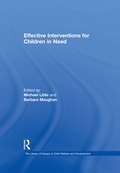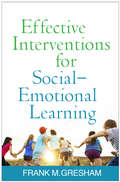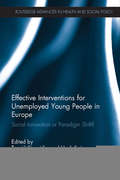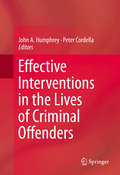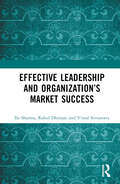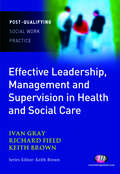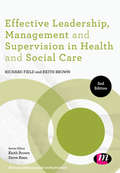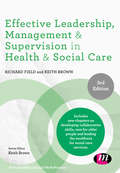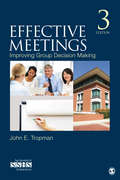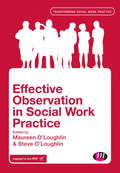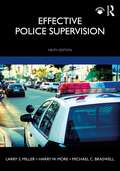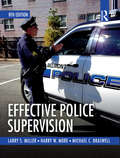- Table View
- List View
Effective Development Co-operation: New Evidence from the Global South (Routledge Explorations in Development Studies)
by Debapriya Bhattacharya Towfiqul Islam Khan Najeeba Mohammed AltafThis book considers how development cooperation principles and practices can be made more inclusive and impactful. Amplifying voices from across the global south, the book combines key thematic discussions with new case studies spanning three continents and three key sectors: agriculture, education, and social protection. Global governance is at a crossroads, and modalities of foreign aid delivery are under stress as international development cooperation continues to lose political traction in provider countries.Presenting a novel and nuanced understanding of the dynamics shaping the global development landscape, this book considers the strategic issues influencing development partnerships and outcomes. It consolidates cross-country policy insights from the global south, based on sectoral experiences shaped by contextual realities. The authors adapt the "Moderator-Mediator" framework as a means of examining the contextual factors shaping development partnerships and consequently leading to “successful” development outcomes in a specific sector at the country level.This book holds special relevance in the current political climate, where the future of development financing is increasingly contested. Global development researchers and students will benefit from the book’s ingenious blending of sector-specific insights and broader discussions of the themes underpinning contemporary development cooperation debates.
Effective Digital Learning: Transforming Traditional Learning Models to a Virtual World
by Lisa SimsTraditional learning as we know it has evolved. Gone are the days when students need to travel to a physical location to learn. With the increase of mobile devices and broadband Internet services, learning can take place anywhere at any time. Effective Digital Learning is here to help you make the paradigm shift with ease. More technology resources are available than ever to help people and organizations affordably present their information online. But, are they as optimized as they can be? Author Lisa Sims provides engaging and insightful tools and tips for delivering content online. Transform your traditional learning models and enhance your online learning models to fit the virtual world with Effective Digital Learning. Many organizations have recently made the jump from in-person conferences and training to providing all-virtual environments in order to keep employees, volunteers, and attendees safe and connected. Stay secure with the most up-to-date knowledge so that you, your organizations, and learners are always prepared. Whether you are a teacher, entrepreneur, or speaker, Effective Digital Learning is the ideal roadmap to have at your side on this innovative new journey. What You Will LearnDiscover how online learning can be an effective method of delivering information to target audiences Think outside the box when it comes to delivering content onlineStructure online learning to engage target audiencesWho This Book Is ForTeachers, entrepreneurs, speakers, and business owners (big and small) who are interested in delivering their knowledge via online platforms, but lack the technical expertise to make it happen.
Effective Discipling in Muslim Communities: Scripture, History and Seasoned Practices
by Don LittleMuslims who come to Christ face momentous spiritual, psychological and social obstacles that drive many to abandon their faith. Often conversion and discipleship are framed by individualistic Western models that do not acknowledge the communal cultural forces that constrain and shape new believers. Effective discipleship requires a more relational, holistic process of Christian identity development and spiritual formation in community. In this comprehensive resource, missiologist Don Little engages the toughest theoretical and practical challenges involved in discipling believers from Muslim backgrounds. He draws on New Testament principles, historical practices and interviews with seasoned disciplers ministering in a dozen countries across the Muslim world. Addressed here are key challenges that believers from Muslim backgrounds face, from suffering and persecution to spiritual warfare and oppression. Also included are implications for the role of disciplers in church planting among Muslims.
Effective Environmental Emergency Responses: A Holistic Response
by Paul A. EricksonThis book focuses on the variety of subsequent consequences that may follow the conclusion of the immediate emergency response effort, consequences that require multi-disciplinary efforts and most likely may require a revamping of the historical interplay of national and other political authorities. The book is essentially a critique of contemporary emergency response which, in both the public perception and, unfortunately, in the mind-set of many practicing professionals emphasizes an emergency as a singular event. It is a mistaken view: an emergency is actually a sequence of multiple, singular events that unfold over time, sometimes measured in days and weeks and, most often, in months, years and decades. This book focuses on the need, in the current and recent past generation to revamp our thinking about planning for and responding comprehensively to those periodic disruptions to daily routine we call "emergencies".
Effective Expert Witnessing, Fourth Edition: Practices for the 21st Century (Routledge Revivals)
by Jack V. Matson Suha F. Daou Jeffrey G. SoperFirst Published in 2004: Effective Expert Witnessing, Fourth Edition broadens the scope of previous editions by featuring case studies and examples from a wide range of disciplines including psychology, medicine, forensics, toxicology, engineering, and environmental science. It presents legal survival strategies needed by expert witnesses in all fields by addressing the impact of the recent rulings regarding expert testimony.
Effective Expert Witnessing: Practices for the 21st Century (Routledge Revivals Ser.)
by Jack V. Matson S. Ravi JagannathanThe testimony of an expert witness can lead to success or failure in cases that hinge on the presentation‘s impact on a jury. Effective Expert Witnessing, Fifth Edition: Practices for the 21st Century explores the fundamentals of litigation, trial preparation, courtroom presentation, and the business of expert witnessing. Extensively updated to ref
Effective Fundraising: The Trustees Role and Beyond
by F. Warren McFarlanCreate a sustainable revenue model that can propel your mission-driven organization into the future Effective Fund Raising: The Trustee's Role and Beyond is the result of author F. Warren McFarlan’s two decades of research at Harvard Business School, along with over forty years of active social enterprise board service. This book offers a depth of knowledge and insight that will prove invaluable for trustees, donors, and others related to and responsible for the success of social enterprise. Social enterprise organizations have played a vibrant and important role in the USA for the past century. And yet, the business of fundraising has not become any easier or more elegant. In this book, you will discover how to help raise the financial resources that your organization needs to perform its good deeds. This book focuses on the steps and strategies you need to know to secure funding to fulfill your mission. Development is the lifeblood of most social enterprises, be they large or small. You’ll also discover how to harness the energies of the right people to ensure the long-term success of your development efforts. Learn why an effective, sustainable revenue model is critical to the success of even the most exciting mission-driven organization Understand the core elements of the revenue model, including governance, fees, the annual fund, capital fundraising campaigns, planned gifts, and more Develop a strong plan for sustaining your organization’s revenue, regardless of organization size Build the skill of asking for money and lead your organization to a revenue and philanthropy orientation Many social enterprise CEOs spend over half of their time on fundraising. Why? Simply put: without a sustainable revenue model, even the most exciting mission-driven organization will collapse. The dirty truth is that, with no fund raising, there is no social enterprise or enduring mission. This book will help you shoulder the burden of fundraising and ensure the long-term success of your venture.
Effective Governance Designs of Food Safety Regulation in the EU: Do Rules Make the Difference?
by Giulia BazzanThis book provides insights on regulatory effectiveness in the field of food safety, by focusing on the variety of institutional factors affecting regulatory outcomes. Drawing upon the Institutional Analysis and Development framework, it investigates differences in effectiveness of food safety regulation and explains them by differences in domestic governance designs, by applying Qualitative Comparative Analysis. The empirical focus of the book is the food safety governance designs of 15 EU Member States, which are investigated through the collection of an original dataset inclusive of measures of independence and accountability of the domestic food safety agencies, of policy capacity and of food safety delivered. The results show the prominent role of the institutional dimension of policy capacity in producing regulatory effectiveness, in conjunction with an integrated model of distribution of the regulatory tasks. As to ineffective governance, the conjunction of low independence or low accountability with low institutional capacity produce ineffective responses.
Effective Grief and Bereavement Support: The Role of Family, Friends, Colleagues, Schools and Support Professionals
by Atle Dyregrov Kari Dyregrov Magne Raundalen` ...a profoundly significant book on a topic rarely discussed and little researched, dealing with sudden or unexpected death. The authors have brought together the latest knowledge in the field, and explore how social networks and professionals working with the bereaved can help. This is an important book for all of us, who will sadly one day experience this... it is a must read for those in the field and those suffering.' - Cary L. Cooper, CBE, Distinguished Professor of Organizational Psychology and Health, Lancaster University `It is nothing short of impressive. Yes, more than impressive, because the down-to-earth nature of the studies and the reader-friendly presentation makes this textbook a gift to us all. And by all of us, I do in fact mean all.' - From the Foreword by Magne Raundalen Effective Grief and Bereavement Support shows how social networks, whether they be friends, colleagues or family, can provide an important source of support following sudden bereavement. Individuals in social networks surrounding bereaved people often feel very uncertain about how best to offer support following the death of someone close. As a result of this, people often find that their relationships with friends and family suffer in the wake of bereavement. Kari and Atle Dyregrov provide concrete, evidence-based advice about how support processes can be improved. Issues covered include common reactions to grief, problems that can arise within families as a result, when to involve professional assistance, how to help bereaved children, and the main principles for effective network support. This book will be essential reading for counsellors, psychologists, psychiatrists, social workers, priests, police, community doctors, hospital staff and teachers, as well bereaved families and those who support them.
Effective Group Therapies for Young Adults Affected by Cancer: Using Support Groups in Clinical Settings in the US (Explorations in Mental Health)
by Sarah F. KurkerOutlining the unique psychosocial and development issues faced by young adults affected by cancer, this text draws on qualitative data from two pilot studies conducted in the US to illustrate how the needs of this often overlooked population can be effectively met via group therapy in clinical settings. Drawing on 25 years of experience as a licensed clinical social worker supporting pediatric and young adult cancer patients and their families, Kurker focuses on the role of the clinician in structuring support group sessions. Chapters draw on patient perspectives to demonstrate effective application of interventions to help adolescents work through trauma associated with a diagnosis of cancer, treatment, recovery, and the impacts on their development. Outcomes from these studies also include strategies for selecting support group participants, structuring group activities, and securing funding. Effective Group Therapies for Young Adults Affected by Cancer will be a valuable text for oncology social workers and clinicians involved in adolescent support services. In addition, researchers and postgraduate students with an interest in the fields of social work, psychology, and adolescent development will find the book of interest.
Effective Human Relations: Interpersonal and Organizational Applications
by Rhonda Barry Reece Reece Monique BrandtMaster the human relation skills you need to become successful managers in today's workplace with one of the most widely used human relations texts available. EFFECTIVE HUMAN RELATIONS: INTERPERSONAL AND ORGANIZATIONAL APPLICATIONS, 12E uses an organizational perspective to help you understand the disparate factors that influence employee behavior. As one of the most practical and applied texts available, EFFECTIVE HUMAN RELATIONS incorporates hundreds of examples of real human relations issues and practices in successful companies. The text establishes seven major themes of effective human relations communication, self-awareness, self-acceptance, motivation, trust, self-disclosure, and conflict resolution as the foundation for study. Self-assessments and self-development opportunities throughout the book teach you to assume responsibility for improving your personal skills and competencies. <p><p> This comprehensive edition addresses topics of emerging importance with expanded coverage of generational differences. The text also explores goal setting, the root causes of negative attitudes, the use of "branding" in the job market, technostress, and emotional intelligence. With EFFECTIVE HUMAN RELATIONS, gain the insights, knowledge and relationship skills you need to deal successfully with the wide range of people-related challenges in business today. Available with InfoTrac Student Collections http://gocengage.com/infotrac.
Effective Interventions for Children in Need (The Library of Essays in Child Welfare and Development)
by Barbara MaughanThis book sets out the current state of knowledge about what works in reducing impairments to children’s health and development. Little and Maughan’s book applies a high standard of proof and reproduces only the work of the leading intervention scientists from around the world. After discussing the real world challenges to more effective children’s services, the book goes on to cover policy and practice proven to change the lives of all children, and extends also to effective programmes targeted at children with specific disorders. Examples include changes in household income, early years support, moving families to less disadvantaged communities, improving parenting and using schools to better mental health. The benefits of evidence-based programmes are specified, as are the costs to society of not intervening. The evidence is used to make recommendations about getting effective policy and practice into routine use, and includes illustrations of successful applications of these ideas.
Effective Interventions for Social-Emotional Learning
by Frank M. GreshamThis book reviews evidence-based, multi-tiered practices for promoting social-emotional learning (SEL) with typically developing students as well as those with special needs. Leading authority Frank M. Gresham, codeveloper of the Social Skills Improvement System--Rating Scales, describes how to systematically assess K-12 students' social skills and plan and implement universal, selected, and intensive interventions. His approach is grounded in cutting-edge research on social-emotional competencies and their role in adjustment and academic achievement. Emphasizing what works, the book showcases programs and strategies that are sequenced, active, focused, and explicit. Detailed case examples and lesson plans illustrate different levels and types of SEL intervention. Reproducible assessment tools can be downloaded and printed in a convenient 8 1/2" x 11" size.
Effective Interventions for Unemployed Young People in Europe: Social Innovation or Paradigm Shift?
by Henk Spies Tomás SirovátkaYoung people in Europe have been disproportionally affected by unemployment as a result of the economic crisis and a large number of the most disadvantaged are migrant youth, or those of a different ethnic origin, living in deprived city neighbourhoods. This book examines the need for more appropriate interventions aimed at improving the inclusion of young people in the labour market, bringing together theoretical reflections and empirical evidence on emerging innovative policies and practices. Using case studies from across Europe, it asks how effectively innovative interventions respond to the specific needs, motivations, aspirations and strategies of unemployed and vulnerable youth within the contextual conditions of the welfare state and locality. It also provides a new theory of the effectiveness of interventions. As social exclusion remains high among young people in Europe, Effective Interventions for Unemployed Young People in Europe is essential reading for policymakers and practitioners. This book demonstrates where we can look for effective innovative interventions and how these can potentially add up to large-scale social innovation. It is also a crucial resource for academics and students interested in social and labour inclusion measures.
Effective Interventions in the Lives of Criminal Offenders
by John A. Humphrey Peter CordellaThis book provides the most current thinking on effective interventions in the lives of criminal offenders. Original articles by leading criminologists provide in-depth analyses of "turning points" in the desistance process experienced by criminal offenders. An understanding of the sources of turning points (or interventions) across the life course is vital to assessing their impact on criminal behavior. Three sources of interventions in criminal careers are identified in the literature: structural location, human agency and situated choice. Structural location refers to the social place occupied by an individual in the social structure: including marital and occupational status, education and income, and so on. Human agency means the active will of an individual to change his or her behavior, that is, the decision to stop engaging in criminal activities. In addition, situated choice coordinates the offender's willingness to end a life of crime with the social structural supports that increase the odds of criminal desistance. This comprehensive book considers all three sources of turning points--structural location, human agency, and situated choice--across the life course of criminal offenders. The book also provides a section on cross-cultural perspectives on the effectiveness of interventions in the careers of criminal offenders. The policy implications of each intervention are considered in individual chapters. In addition, the authors suggest a research agenda to further the understanding of the interplay among the key interventions across the life course. This book will be of interest to researchers studying criminology from a life course perspective, as well as crime prevention, and public policy.
Effective Leadership and Organization’s Market Success
by Rahul Dhiman Ila Sharma Vimal SrivastavaEffective leadership and organizational performance are concepts that continue to receive widespread attention in the business world. This book explores the importance of strategic leadership and the value it adds to organizations. It focuses on strategies to achieve market success and organizational performance as well as the challenges of leading in a fluctuating market. The book looks at recent trends in leadership development and the different styles of leadership. It dispels existing myths about leadership and offers an understanding of principles which will allow leaders to be more adaptable and effective and steer businesses and organizations into a more stable future. This book will be of interest to researchers and students working in the field of business, organizational communication, business management, human resource management and business studies.
Effective Leadership, Management and Supervision in Health and Social Care
by Keith Brown Ivan Gray Richard FieldThis book offers a comprehensive introduction to the areas of leadership, management and supervision for line managers, supervisors and senior practitioners Taking a problem-solving approach, the book explores different aspects of leadership and management including personal effectiveness, managing and leading supervision, managing training and development, managing resources and leading and developing a team. A precise review of each project area is linked to a set of audit tools that a manager can mobilise in order to review team and personal effectiveness and develop practice.
Effective Leadership, Management and Supervision in Health and Social Care (Post-Qualifying Social Work Practice Series)
by Keith Brown Dr Richard FieldThis is a practical introduction to the areas of leadership, management and supervision for line managers, supervisors and senior practitioners working in health and social care settings. The book explores different aspects of leadership and management including personal effectiveness, strategic thinking, supervision, planning and budgeting, effective change leadership and leading successful teams. <p><p> Alongside new chapters on leading in an integrated environment, commissioning and self-leadership, this second edition has been greatly enriched through the inclusion of knowledge, experience, insight and expertise from a wide range of contributors, including senior leaders, lecturers, consultants and researchers, each with many years of experience working in health and social care.
Effective Leadership, Management and Supervision in Health and Social Care (Post-Qualifying Social Work Practice Series)
by Keith Brown Dr. Richard FieldThis book offers a practical introduction to the areas of leadership, management and supervision for line managers, supervisors and senior practitioners working in health and social care settings. The authors explore different aspects of leadership and management, including personal effectiveness, supervision, strategic thinking, commissioning, planning and budgeting and leading successful teams. This third edition also includes new chapters on leading services and care for older people, leading the workforce for health and social care services for older people and developing collaborative skills. There is also increased coverage of healthcare leadership and asset-based commissioning.
Effective Leadership, Management and Supervision in Health and Social Care (Post-Qualifying Social Work Practice Series)
by Keith Brown Dr. Richard FieldThis book offers a practical introduction to the areas of leadership, management and supervision for line managers, supervisors and senior practitioners working in health and social care settings. The authors explore different aspects of leadership and management, including personal effectiveness, supervision, strategic thinking, commissioning, planning and budgeting and leading successful teams. This third edition also includes new chapters on leading services and care for older people, leading the workforce for health and social care services for older people and developing collaborative skills. There is also increased coverage of healthcare leadership and asset-based commissioning.
Effective Meetings: Improving Group Decision Making
by Dr John E. TropmanLauded for its accessible format and humorous writing style, Effective Meetings: Improving Group Decision Making by John E. Tropman, offers practical strategies for running effective meetings by highlighting the processes involved in decision making and the ways individuals contribute to making better quality decisions as a group. The Third Edition of this brief text begins with guidelines for effective decision making, then covers topics that include member recruitment, meeting preparation, agenda building, and the positions and roles required for effective meeting outcomes. Subsequent chapters deal with electronic meeting formats, the chair and participants, and the various types of meeting groups such as boards, advisory groups, and staff groups. Author John E. Tropman teaches at the University of Michigan in the School of Social Work, the Stephen M. Ross School of Business, and the Executive Education Programs. Dr. Tropman also works with for-profit, nonprofit, and government entities in a consultative capacity.
Effective Observation in Social Work Practice (Transforming Social Work Practice Series)
by Maureen O'Loughlin Steve O'LoughlinIntroducing the concept of observation to social work students can be a complex and challenging task. Assessing their observation skills and assignments can be even harder, especially if much of this work takes place implicitly, throughout their training and placements. This book will help students to grasp the fundamentals of social work observation, from the theories and methods to how these can be demonstrated in everyday practice. Skills are covered throughout, as well as effective observation work with different client groups and in different settings. The authors argue that an observant social worker is an effective and resilient one, and demonstrate this through case study material and research summaries.
Effective Personal and Professional Judgement in Social Work: How personal biography can affect professional effectiveness
by Denise Harvey Arlene WeekesThis is a simple and effective guide for social work students and seasoned practitioners empowering them to understand and navigate how to make fair and objective decisions while cultivating a heightened awareness of their own personal biases.Our personal experiences from birth to the present can shape our conscious and unconscious decisions in everyday life. Yet this may lead to unfair or harmful decision making in the social work environment. This book provides a step-by-step guide on how to develop effective personal and professional judgement, backed up with theory and research to help readers increase their self-awareness, understand their own unconscious bias and how it can affect their decision making.Reflective exercises and practical examples are provided throughout to encourage readers to consider how they might implement their new understanding when making decisions in their social work roles.
Effective Police Supervision
by Larry S. Miller Harry W. More Michael C. BraswellEffective Police Supervision, 9th ed., is a time-tested text providing complete coverage of the organizational dynamics surrounding leadership of teams in an effective police department. This revised edition provides readers with the tools to excel and advance with up-to-date and timely scholarly research and legal case law on supervision. Special attention is given to recruitment, selection, and retention of police, commonly believed to be the most challenging internal issue facing agencies today. Supervisory tactics are evaluated in terms of how they work not only in the United States but in the United Kingdom and Canada as well, and chapters are enhanced with boxed features that help the reader connect ideas with realistic situations. Combining behavioral theory and updated case studies, Effective Police Supervision is the preferred textbook for college-level classes on police supervision and is an essential resource for preparation for promotional exams and career development for law enforcement officers and supervisors. Information has been included to respond to current issues facing law enforcement with Covid-19 and managing protests.
Effective Police Supervision
by Larry S. Miller Michael BraswellOutstanding first-line supervisors are essential to the success of any law enforcement agency, yet many officers lack the supervision training necessary to excel. Effective Police Supervision immerses readers in the group behaviors and organizational dynamics supervisors must master in order to lead their teams and to help create an effective police department. Combining behavioral theory and updated case studies, this core text, now in its eighth edition, is a vital tool for all college students pursuing criminal justice courses on supervisory practices, as well as police officers preparing for promotional exams.
